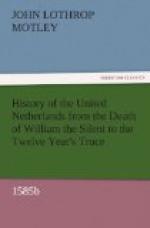Parma replied by another letter, dated December 3rd. He assured the citizens that Henry III. was far too discreet, and much too good a friend to Philip II., to countenance this rebellion. If he were to take up their quarrel, however, the King of Spain had a thousand means of foiling all his attempts. As to the religious question—which they affirmed to be the sole cause of the war—he was not inclined to waste words upon that subject; nevertheless, so far as he in his simplicity could understand the true nature of a Christian, he could not believe that it comported with the doctrines of Jesus, whom they called their only mediator, nor with the dictates of conscience, to take up arms against their lawful king, nor to burn, rob, plunder, pierce dykes, overwhelm their fatherland, and reduce all things to misery and chaos, in the name of religion.
Thus moralizing and dogmatizing, the Prince concluded his letter, and so the correspondence terminated. This last despatch was communicated at once both to the States-General and to the French government, and remained unanswered. Soon afterwards the Netherlands and England, France and Spain, were engaged in that vast game of delusion which has been described in the preceding chapters. Meantime both Antwerp and Parma remained among the deluded, and were left to fight out their battle on their own resources.
Having found it impossible to subdue Antwerp by his rhetoric, Alexander proceeded with his bridge. It is impossible not to admire the steadiness and ingenuity with which the Prince persisted in his plans, the courage with which he bore up against the parsimony and neglect of his sovereign, the compassionate tenderness which he manifested for his patient little army. So much intellectual energy commands enthusiasm, while the supineness on the other side sometimes excites indignation. There is even a danger of being entrapped into sympathy with tyranny, when the cause of tyranny is maintained by genius; and of being surprised into indifference for human liberty, when the sacred interests of liberty are endangered by self-interest, perverseness, and folly.
Even Sainte Aldegonde did not believe that the bridge could be completed. His fears were that the city would be ruined rather by the cessation of its commerce than by want of daily food. Already, after the capture of Liefkenshoek and the death of Orange, the panic among commercial people had been so intense that seventy or eighty merchants, representing the most wealthy mercantile firms in Antwerp, made their escape from the place, as if it had been smitten with pestilence, or were already in the hands of Parma. All such refugees were ordered to return on peril of forfeiting their property. Few came back, however, for they had found means of converting and transferring their funds to other more secure places, despite the threatened confiscation. It was insinuated that Holland and Zeeland were indifferent to the fate




